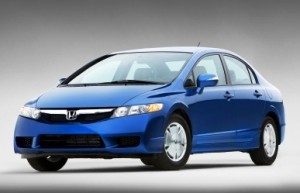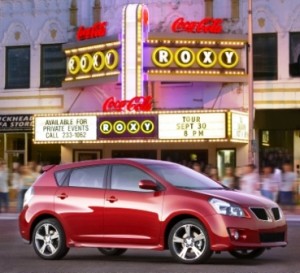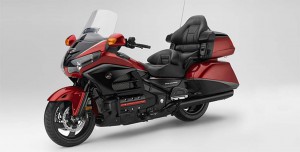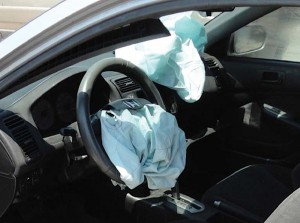The biggest safety recall in U.S. automotive history is about to get even bigger, eight automakers revealing they will recall 12 million vehicles to replace faulty Takata airbag inflators.
The move follows last month’s announcement by the National Highway Traffic Safety Administration that it wanted as many as 40 million inflators replaced because they could malfunction during crashes. The exact number of vehicles that would cover wasn’t clear because some vehicles use more than one of the suspect devices.
The list of manufacturers covered by the latest recall includes Toyota – which announced some other airbag service actions earlier this week – Fiat Chrysler, Mazda, Nissan, Subaru, Ferrari and Mitsubishi. And Honda will not only recall 2.2 million more automobiles but 2,700 of its Gold Wing motorcycles equipped with optional front airbags.
Separately, the Japanese transport ministry said Friday it has ordered the recall of 7 million more vehicles equipped with Takata inflators.
The announcement is expected to put further pressure on troubled Japanese supplier Takata, one of the world’s largest suppliers of airbag systems. Responsible for much of the costs related to the ongoing recalls, Takata posted a sizable loss during the most recent quarter and has confirmed it has hired restructuring firm Lazard to plan its future strategy. It is believed to be discussing a sale with several possible buyers including investment firm KKR.
(For more on that possible sale, Click Here.)
Until last month, about 24 million vehicles using Takata airbags had been targeted for recall. Due to an apparent manufacturing defect, those bags were prone to overinflate when triggered by a crash, sending shards of plastic and metal spewing into the passenger compartment. So far, 13 deaths have been linked to the defect, including 10 in the U.S., most recently a 17-year high school student killed in an otherwise survival crash in Texas.
Initially, safety investigators focused on older vehicles used in hot, high humidity climates in places like Puerto Rico and Southern Florida. And some of the latest recalls are geographically targeted at those regions. In Japan, the latest recalls cover only vehicles with airbags that do not contain special desiccant material that can keep the airbag inflators dry.
(Honda earnings take big hit due to Takata recall. Click Here for more.)
But that may not satisfy all of Takata’s critics. A recent, industry-funded study warned that the very chemical used in the supplier’s airbags inflators, ammonium nitrate, may become unstable – whether or not exposed to high humidity – over time. Safety advocates such as Clarence Ditlow, head of the Center for Auto Safety, want all Takata airbags using ammonium nitrate inflators recalled. Notably, the supplier has promised to switch to a more stable chemical going forward.
The latest recalls will be phased in over time, focusing initially on models built through 2011 and exposed to high heat and humidity. Next will be vehicles built in 2008 or before and sold in the broader Southern U.S. The final phase will focus on vehicles build through 2004 and operated in the rest of the country.
(Automakers under fire for bending the truth about safety, emissions, mileage problems. Click Here for more on the industry’s ethical crisis.)
The three-tier approach reflects the challenge automakers are facing finding necessary replacement airbag inflators. Takata itself cannot meet the demand for the original 24 million vehicles recalled and some makers – including Toyota and BMW – have contracted with other airbag suppliers to help out.
There is a growing concern in the industry that the newest recall could bankrupt Takata and make it even more difficult to complete the recall. As of March, only about a third of the original, 24 million vehicles had been repaired.
Here is a complete list of the vehicles covered by the latest recall:
HONDA: Certain 2003-2006 Acura MDX, 2005-2011 Acura RL, 2009-2011 Acura TSX, 2010-2011 Acura ZDX, 2008-2011 Honda Accord, 2010-2011 Honda Accord Crosstour, 2006-2011 Honda Civic, 2005-2011 Honda CR-V, 2003-2011 Honda Element, 2010-2011 Honda FCX Clarity, 2007-2011 Honda Fit, 2010-2011 Honda Insight, 2002-2004 Honda Odyssey, 2003-2011 Honda Pilot, 2006-2011 Honda Ridgeline, certain 2006-2010 Honda Gold Wing motorcycles.
FIAT CHRYSLER: Certain 2007-2009 Chrysler Aspen SUVs, 2005-2012 Chrysler 300, 2008-2012 Dodge Challenger, 2006-2012 Dodge Charger, 2005-2011 Dodge Dakota pickups, 2004-2009 Dodge Durango SUVs, 2005-2008 Dodge Magnum wagons, 2004-2008 Ram 1500 pickups, 2005-2009 Ram 2500 pickups, 2006-2009 Ram 3500 pickups, 2007-2010 Ram/Ram 3500 cab chassis, 2008-2010 Ram/Ram 4500/5500 cab chassis, 2007-2012 Jeep Wrangler SUVs, 2006-2009 Mitsubishi Raider pickups, 2008-2009 Sterling/Bullet 4500/5500 cab chassis.
TOYOTA: Some 2008-2011 Scion xB and Lexus IS F, 2009-2011 Toyota Corolla and Matrix, 2006-2011 Toyota Yaris, Lexus IS250 and Lexus IS350, 2010-2011 Toyota 4Runner, Lexus IS250C, Lexus IS350C and Lexus GX460, 2011 Sienna, 2007-2011 Lexus ES350, and 2009-2010 Pontiac Vibes designed for General Motors by Toyota.
MAZDA: Some 2009-2011 Mazda6, 2007-2011 CX-7 and CX-9, 2004-2011 RX-8, 2004-2006 MPV, 2003-2008 Mazda6, 2006-2007 Mazdaspeed6
SUBARU: Certain 2003-2004 Legacy and Outback, 2006 Saab 9-2x made by Subaru, and 2003-2006 Baja pickups. Also certain 2009-2011 Legacy, Outback and Forester; 2006-2011 Impreza and Tribeca.
NISSAN: Certain 2005-2008 Infiniti FX35 and FX45, 2003-2004 Infiniti I30 and I35, 2006-2010 Infiniti M35 and M45, and 2007-2011 Nissan Versa.
FERRARI: Certain 2009-2011 Ferrari California and 2010-2011 458 Italia.
MITSUBISHI: Certain 2006-2007 Lancer and Lancer Evolution cars.




